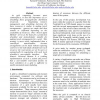Free Online Productivity Tools
i2Speak
i2Symbol
i2OCR
iTex2Img
iWeb2Print
iWeb2Shot
i2Type
iPdf2Split
iPdf2Merge
i2Bopomofo
i2Arabic
i2Style
i2Image
i2PDF
iLatex2Rtf
Sci2ools
102
click to vote
JSSPP
2005
Springer
2005
Springer
Co-scheduling with User-Settable Reservations
As grid computing becomes more commonplace, so does the importance of coscheduling these geographically distributed resourcest. Negotiating resource management and scheduling decisions for these resources is similar to making travel arrangements: guesses are made and then remade or confirmed depending on the availability of resources. This “Travel Agent Method” serves as the basis for a production scheduler and metascheduler suitable for making travel arrangements for a grid. This strategy is more easily implemented than a centralized metascheduler because arrangements can be made without requiring control over the individual schedulers for each resource: the reservations are set by users or automatically by negotiating with each local scheduler’s user-settable interface. The Generic Universal Remote is a working implementation of such a system and proves that a user-settable reservation facility on local schedulers in a grid is sufficient to enable automated metascheduling.
| Added | 28 Jun 2010 |
| Updated | 28 Jun 2010 |
| Type | Conference |
| Year | 2005 |
| Where | JSSPP |
| Authors | Kenneth Yoshimoto, Patricia A. Kovatch, Phil Andrews |
Comments (0)

